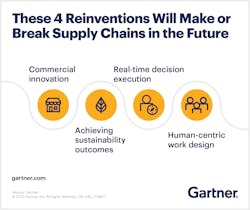Strategies for Giving Your Supply Chain a Competitive Edge
Jordan Turner, in an article on Gartner's website, “ Four Initiatives that Give Your Supply Chain a Competitive Advantage", notes that 80-90% of supply chain execs plan to rethink these four areas; customer enablement, sustainability, real-time executive and human-centric work design.
Supply chain will move beyond customer satisfaction to customer enablement
Customers enabled by the supply chain to get their own jobs done are twice as willing to repurchase as customers who were merely satisfied. Yet, only 23% of supply chain organizations focus on enabling customers.
“To achieve customer enablement, you must prioritize it and ensure there is no one-size-fits-all across the supply chain and no one-size-fits-every interaction for a specific customer,” says Jennifer Loveland, Senior Director Analyst, in a statement
Supply chain will embed sustainability in operations
Engaging in circular economy activities is important to 75% of supply chain leaders. Yet, in support of achieving sustainability outcomes, only 19% believe they have sufficient capabilities.
According to Gartner research, high-performing organizations pivoted from profit-driven to purpose-driven across the entire organization spanning awareness activities (such as strategy, vision, goals and objectives) to alignment on roles and decision-making (such as org structure, metrics, data and product development).
Supply chain will move beyond real-time analytics to real-time execution
Closing the gap between the time spent making a decision and then executing that decision is a focus for 96% of supply chain leaders. Yet, on average, only 7% have real-time decision execution.
In the short and long term, real-time decision making still creates a competitive advantage given relatively low levels of adoption and challenges many organizations have with legacy technology
Supply chain will implement human-centric work design
Labor shortages are a top challenge for 60% of supply chain organizations, and the workforce is the top priority for board directors in 2023. Yet, one-third of supply chain organizations lack an effective employee value proposition (EVP) to attract, retain and engage the needed talent based on human-centric work design.

